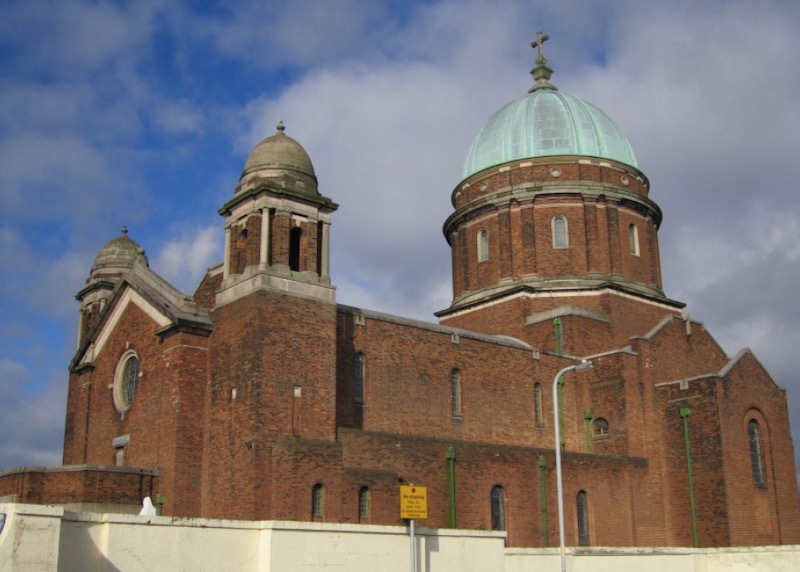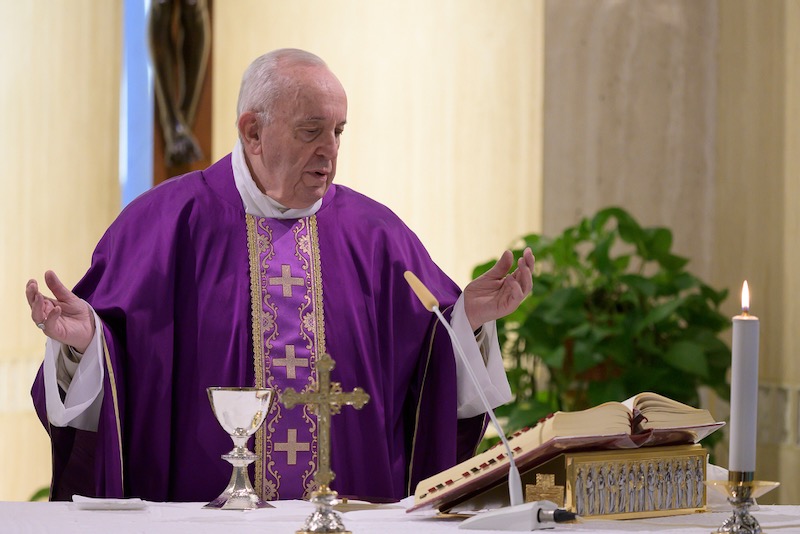Businesses should not use the Covid-19 crisis to sack people and must show solidarity with their workforce during the pandemic, Pope Francis has said.
“A company that lays off employees to save itself is not a solution. In this moment, instead of laying off, we must welcome and make everyone feel that there is a society of solidarity,” he told Spanish journalist Jordi Évole during a Skype television interview.
With Italy in its third week of lockdown, including the closure of all factories, the 83-year-old used his early morning Mass on Monday to pray for those hit financially by the crisis, particularly those who cannot work.
“All of this affects the family. We pray for those people who have this problem,” Francis said at the beginning of the liturgy.
Governments across Europe have moved quickly to provide financial support to keep businesses afloat during the crisis, while offering people mortgage holidays and deferred tax payments. When asked by Evole about reports of firms using the crisis to fire their staff, the Pope stressed that “every man for himself" thinking is not the answer and urged businesses to come up with “concrete solutions”.
The 83-year-old Pope, who continues to work in a closed-down Vatican, confessed to feeling alone “in the desert”.
Although he has experienced crises of faith in the past, Francis said he was not going through one at the moment.
"I have had my crises of faith and I have resolved them by the grace of God.”
Francis hoped that the coronavirus would lead people to “rethink their lives”.
The pandemic is revealing the heroic self-sacrificial service by priests and religious sisters in Italy, while also forcing changes to Church practice, given that public liturgies have been suspended across Europe.
Fifty priests have reportedly died in Italy after ministering to people during the crisis, with 11 of them from Bergamo: the youngest was 45 and the oldest 104.
Religious sisters are also on the front line. The Daughters of St Camillus run five hospitals, including three in northern Italy which is at the heart of the Covid-19 crisis. Forty of the sisters have contracted the virus, while 19 other sisters, from the Angelic Sisters of Saint Paul convent in Rome have been diagnosed with the killer bug.
Meanwhile, thousands of ordinary believers are making use of live streamed church services either online or on terrestrial television: 500,000 in Italy are watching the Pope’s Mass through the Italian bishops’ conference channel TV2000, while the German state broadcaster ZDF said 1.4 million tuned into last Sunday’s televised service – double the normal figure.
Other changes introduced include individual confessions. Last week, the Pope explained that during the emergency period confessions can take place without seeing a priest while the Vatican has issued new guidelines on forgiveness of sins.
“Many will say to me: ‘But Father…I can't leave the house and I want to make my peace with the Lord…How can I do that unless I find a priest’?” the Pope said during his Mass on 20 March. “Do what the catechism says. It's very clear. If you don't find a priest to go to confession, speak to God. He’s your Father. Tell Him the truth: ‘Lord. I did this and this and this. Pardon me.’
"Ask His forgiveness with all your heart with an act of contrition, and promise Him, ‘afterward I will go to confession.’ You will return to God's grace immediately.”
The Vatican issued new guidelines on “general absolution”, offering forgiveness of sins to groups of people without them having to confess individually to a priest. The Apostolic Penitentiary ruled that in places hard hit by the virus a blanket absolution can be offered: for example, a priest or bishop who is unable to enter a hospital.
They should, the guidelines added, use an “amplification of the voice, so that the absolution may be heard.” Church rules allow for general absolution to be offered in times of “grave need” although in the years following the 1962-65 Second Vatican Council the penitential services where general absolution was offered were more widespread.
Anecdotal evidence suggested it led to a rise in individual confessions. But during the 1980s and 1990s the Holy See clamped down on the use of general absolution and sought to heavily restrict its use.
Along with the absolution guidelines, the apostolic penitentiary also offered plenary indulgences to those “suffering from the coronavirus, subject to quarantine by order of the health authority, or in their own homes.”
According to Catholic teaching indulgences remove all "punishment” in this life or the next for sins that have been confessed and forgiven.
The conditions for the indulgence require those “with a spirit detached from any sin” to “unite themselves spiritually through the media to the celebration of Holy Mass, to the recitation of the Holy Rosary, to the pious practice of the Way of the Cross or other forms of devotion, or if at least they will recite the Creed, the Lord's Prayer and a pious invocation to the Blessed Virgin Mary.”
But the new ruling waives the normal requirement to also attend Mass in person and make a personal confession in order to receive the indulgence. It simply says that penitents should have “the will” to fulfil these conditions.
The Tablet has set up an online collection of resources for Catholics on the Coronavirus outbreak, which can be found here.



 Loading ...
Loading ...